Leather made from mushrooms: Alternative materials making waves through the fashion scene
This article was first published on Startup SG on 8 February 2023
Leather made from mushrooms: Alternative materials making waves through the fashion scene
With a vision to empower local communities through high-performance and sustainable material made for the global market, five friends, came together in 2018 to establish Mycotech (MYCL) in Singapore. The bio-based material startup cultivates agri-waste based materials bound by mushroom mycelium which acts as a natural adhesive. This innovative technology forms MYCL’s MyleaTM biofabrication leather, a material that resembles animal leather.
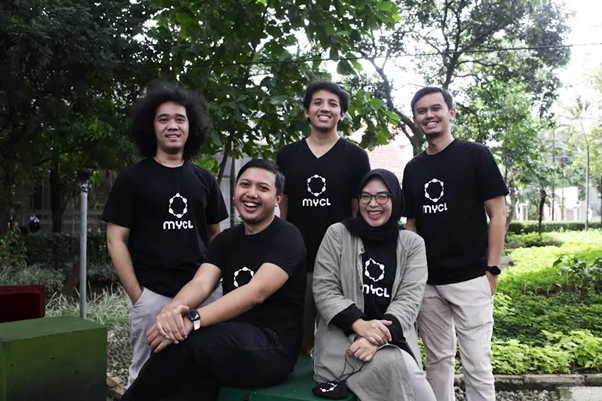 Featured in the photo are Adi and the co-founders of MYCL
Featured in the photo are Adi and the co-founders of MYCL
The effective leather replacement has been made into watches and other award-winning leather products through MYCL’s collaborations with both global and homegrown brands, such as Doublet and WTF! We The Future.
Today, we speak with Adi, Co-Founder of MYCL and EntrePass holder, as he shares more about his startup journey and the road ahead for MYCL.
1. Tell us more about yourself and the origins of MYCL. How did you come up with this idea?
As part of a school project while studying architecture in university, I visited a small village in Indonesia to better understand rural building structures and community culture. The village had no electricity or internet connection, but the local community lived fulfilling and self-sufficient lives with available resources. Inspired by their eco-conscious way of living where they incorporated agriculture into their daily lives, we built on the idea and decided to explore the potential of agriculture and its sustainable structures. This led us to the discovery of mycelium, the root-like structure of mushrooms.
With our existing expertise in architecture, we originally planned to use mycelium as building materials. However, through networking among industry experts and personal connections, we unravelled a subsequent problem statement - the need for sustainable leather in fashion products like sneakers. We decided to transform myceliumsinto a material that mimicked characteristics of leather, down to the grain and feel. Naturally, this forged the future direction of MYCL and our team.
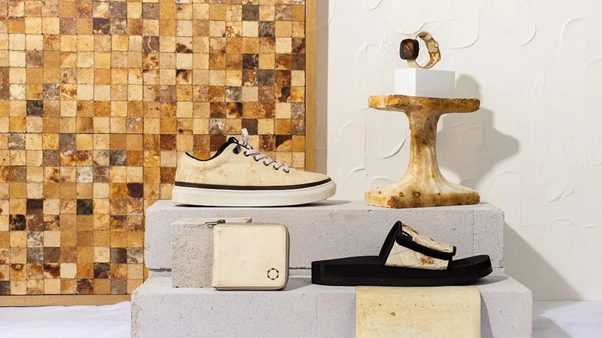 Featured in the photo are products that have been made using mycelium
Featured in the photo are products that have been made using mycelium
2. What attracted you to incorporate in Singapore and was it a strategic decision?
Singapore plays a leading role in the sustainability movement, with sustainability, social and environmental causes widely discussed here. With that in mind, incorporating our company in Singapore accelerated our innovation and funding.
The research facilities and institutes in Singapore also proved to be strong and have provided MYCL with abundant opportunities to collaborate and develop new technologies and improve our product through networks. We are also currently collaborating with Temasek Life Sciences to allow us to objectively evaluate the feasibility of using their proprietary bio-glue technology to adhere MYCL’s mycellium leather with fabric.
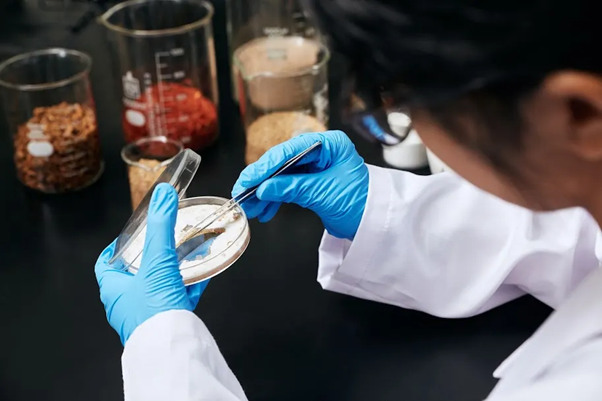 Featured in the photo is part of the research work conducted between MYCL and local research institution
Featured in the photo is part of the research work conducted between MYCL and local research institution
We were also part of DBS Foundation’s Social Enterprise Grant programme, where we joined their bootcamp and successfully received two grants that accelerated our prototype development and scaled up efforts. Our participation in the programme helped us to further strengthen our IP and trademarking, as well as scale our business through connections with relevant stakeholders.
Lastly, Singapore has a sizeable target consumer group, with Singaporeans and local companies showing keen interest in sustainable lifestyles and high demand for eco-friendly products despite its higher prices.
3. MYCL also participated in The Bridge Fashion Innovator’s (TBFI) incubation programme in Singapore in 2019. How has this experience been beneficial for MYCL?
We are glad to have been one of the participants in TBFI’s incubation programme. As an EntrePass partner, TBFI helped us to quickly pick up fashion trends and relevant knowledge of industry standards through its programme, all of which further confirmed our research that there was demand for sustainable offerings in the fashion industry.
The programme also gave us the opportunity to learn from industry experts and build connections with global brand players as well as potential investors. Overall, it was a valuable experience we are thankful for.
4. In your opinion, how has sustainability evolved within the global fashion space? What role does MYCL play in this movement?
After the pandemic, the fashion landscape has significantly changed all around the world. Back then, most consumers were more price sensitive and would usually opt for lower-priced products. This usually encouraged less eco-friendly methods of production. However, with the pandemic influencing retail store operations, affecting consumer demand levels and disrupting supply chain logistics, many retail stores have closed, consumption is lessening, and supply chains have been disrupted.
This is where MYCL plays our role to offer sustainable fashion solutions to consumers globally. We are currently working with six brands from Germany, France, Spain and the US to explore the usage of mycelium leather.
5. What technologies will front the next fashion revolution and how does MYCL plan to stay ahead?
Brands are constantly looking for solutions that will minimise reliance on plastics and synthetic materials. Currently, we see a high demand for synthetic leather as a replacement for animal leather. However, synthetic leather is not sustainable as it is made from fossil fuels.
We believe that our mycelium leather is the next best alternative leather. In order to stay ahead, we are continuing our collaborations with research institutions to further improve our product.
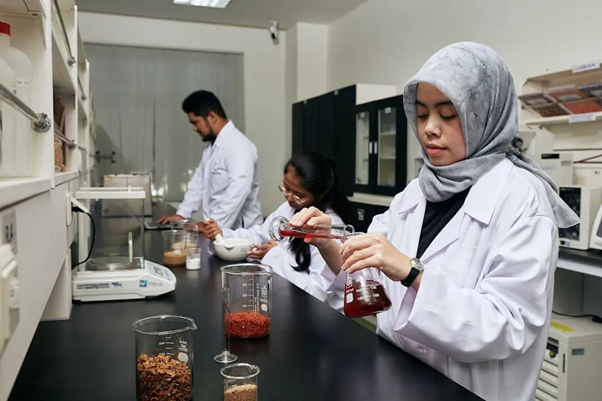 Featured in the photo shows the collaboration between MYCL and local research institution
Featured in the photo shows the collaboration between MYCL and local research institution
6. What are MYCL’s plans for 2023?
As we gain traction, we intend to scale up our production of mycelium leather to meet increasing product demands in the coming year. We are delighted to share that we have successfully closed our pre-series A funding round in 2022 and are confident in our upcoming funding round later this year.
Besides funding, we are also exploring the circular economy of the palm oil industry. One of the raw materials needed to produce mycelium leather is palm oil waste and we hope to collaborate with several Singapore and Indonesia companies to acquire and recycle their agricultural waste. The access to sufficient raw materials will enable us to speed up our production process and reduce costs at the same time.
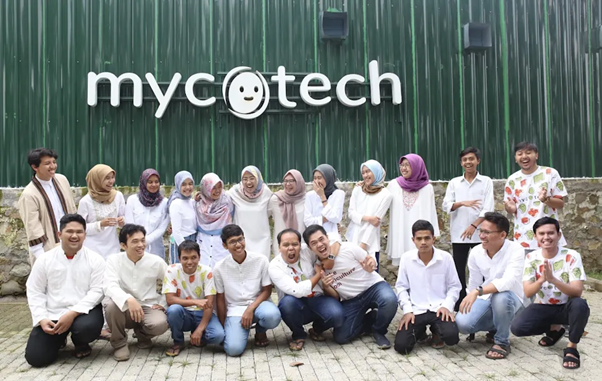 Featured in the photo is MYCL’s team
Featured in the photo is MYCL’s team
7. What advice would you give budding entrepreneurs interested to venture into the sustainability space?
Focus on “doing good” and “doing well”.
Doing good means achieving a social purpose and doing well ensures the profitability of the business. We need to remember that these two come hand in hand and it is important to synergise both objectives to achieve something great.
Find out how Startup SG can support you to kickstart your entrepreneur journey in Singapore here.

